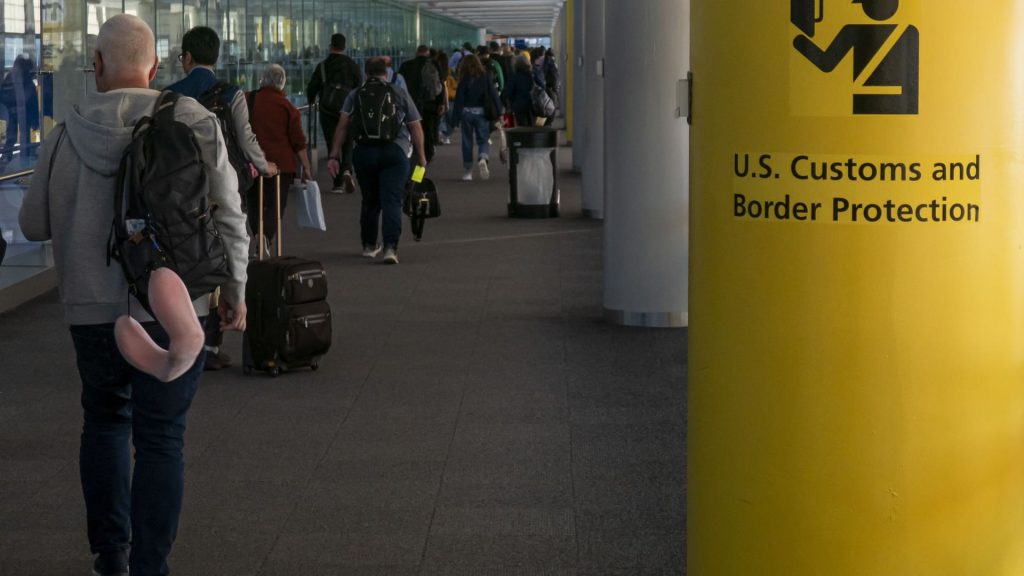Recent developments in U.S. border policy have caused a wave of anxiety among European companies regarding their employee travel to the United States. Amid stringent immigration regulations and heightened scrutiny under the current administration, some firms are reevaluating their travel protocols. This shift impacts not only business trips but also international tourism, raising concerns over the economic implications for multiple sectors.
| Article Subheadings |
|---|
| 1) Rising anxiety over U.S. travel |
| 2) Increased travel protocols for safety |
| 3) Impact on academic collaborations |
| 4) Industry assessments and concerns |
| 5) Economic ramifications of travel caution |
Rising anxiety over U.S. travel
The turbulent policy landscape regarding U.S. travel has fostered a climate of uncertainty, particularly as international relations deteriorate. Since the inauguration of the current administration, immigration control has become a focal point, with reports indicating that travelers experience excessive delays and sometimes extended detentions. The White House has emphasized a need for meticulous vetting, leading to fears that such policies may create deterrents for foreigners wishing to enter the U.S.
In this context, reports have emerged of particularly alarming incidents where travelers were held at airports despite possessing valid documentation. These occurrences not only raise concerns about individual welfare but also threaten to undermine international collaboration and trust. Concerns are especially pronounced among individuals with higher public profiles, as they are often subject to greater scrutiny.
Increased travel protocols for safety
In response to the heightened scrutiny, many organizations are revising their travel protocols to ensure employee safety. For companies engaged in sensitive sectors—including those dealing with politically charged issues—travel advice has become more cautious. Employees are encouraged to use wiped electronic devices, travel via Canada to avoid U.S. border checks, and attend conferences virtually whenever feasible.
A partner at a management consultancy noted that international travelers are expressing apprehension about the possibility of being targeted.
“We’re hearing some international travelers have expressed unease about visiting the U.S. due to increased visa scrutiny and social media monitoring.”
As a part of their updated travel protocols, companies are adopting measures previously associated with travel to more autocratic regimes.
Impact on academic collaborations
The apprehension surrounding U.S. travel has noticeably affected academic institutions and research collaborations. Scholars report difficulty in attending conferences, and some have even decided against trips to American universities due to fears of complications at the border. This shift impacts not only individual careers but also the broader academic environment, which thrives on international exchanges of ideas and research.
An academic in Switzerland shared insights on how institutional policies have adapted, advising faculty to postpone or virtually attend meetings in the U.S. to sidestep potential visa complications.
“Some of our colleagues were still making trips to the U.S. without incident, but others have faced increased questioning at the border.”
The ripple effect of these decisions can stall research progress and diminish opportunities for collaboration.
Industry assessments and concerns
The broader business environment is also feeling the strain, with many companies expressing concern about incoming and outgoing travel. According to a survey by a global travel association, nearly 30% of travel buyers expect a decline in business travel due to U.S. policies. This downturn could have severe implications, with an estimated $12.5 billion loss in international tourism spending anticipated this year.
There is a raised awareness within corporations about the repercussions of travel on their bottom lines, particularly in the aviation sector, which depends heavily on business travel. The outlook for the travel industry is concerning, as tensions and fears around immigration and international relations feed into broader economic instability.
Economic ramifications of travel caution
As companies adapt their travel strategies, the implications extend into economic factors that are critical for the U.S. market. Business travel constituted a substantial revenue source before the surge in concerns regarding travel safety, accounting for approximately $421 billion and generating $119 billion in tax revenue in 2022 alone.
With the apprehension surrounding U.S. immigration policies holding sway, a long-term decline in business trips could hinder economic recovery efforts post-pandemic. Moreover, reduced tourism can jeopardize millions of jobs that are directly tied to travel and hospitality industries, further exacerbating economic volatility.
| No. | Key Points |
|---|---|
| 1 | European companies are reassessing U.S. travel protocols amid strict immigration scrutiny. |
| 2 | Heightened concerns have led organizations to implement more stringent travel policies. |
| 3 | Academic collaborations are hampered as scholars face increased challenges in traveling to the U.S. |
| 4 | Business travel could face a significant decline due to negative perceptions of U.S. policies. |
| 5 | The economic impact could reach $12.5 billion in lost international tourism revenue. |
Summary
The evolving regulatory landscape concerning U.S. travel is prompting widespread caution among European companies, impacting both business and academic travel. As firms navigate this uncertain terrain, the implications for the economy are profound, extending from reduced business trips to significant job losses in industries reliant on travel and tourism. As perceptions of risk continue to evolve, companies may need to adopt comprehensive strategies to mitigate potential losses while continuing to support essential international travel.
Frequently Asked Questions
Question: How have U.S. travel policies changed recently?
Recent U.S. travel policies have become more stringent, with increased scrutiny at borders and potential delays in visa processing, often leading to detentions that create uncertainty for international travelers.
Question: What measures are companies taking to ensure employee safety during U.S. travel?
Companies are adopting new travel protocols, including using wiped electronic devices, recommending travel via Canada, and opting for virtual attendance at conferences to minimize risks associated with immigration checks.
Question: What are the economic implications of the decline in business travel?
The decline in business travel could result in significant losses, estimated at $12.5 billion in international tourism spending, affecting jobs in sectors directly reliant on travel and hospitality.
